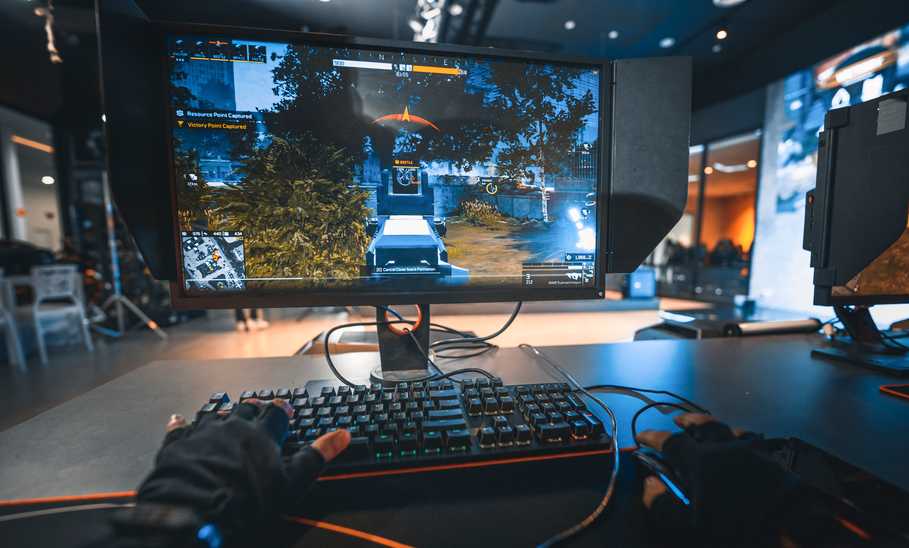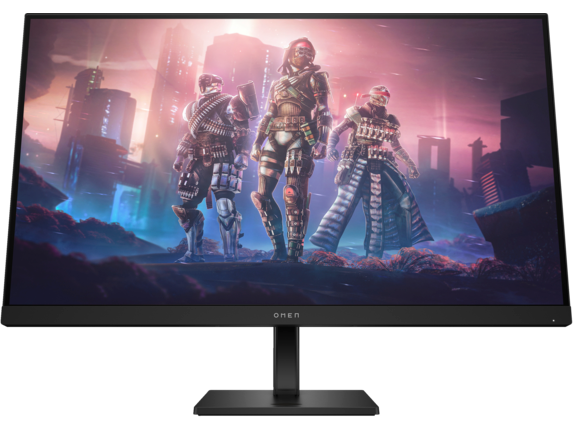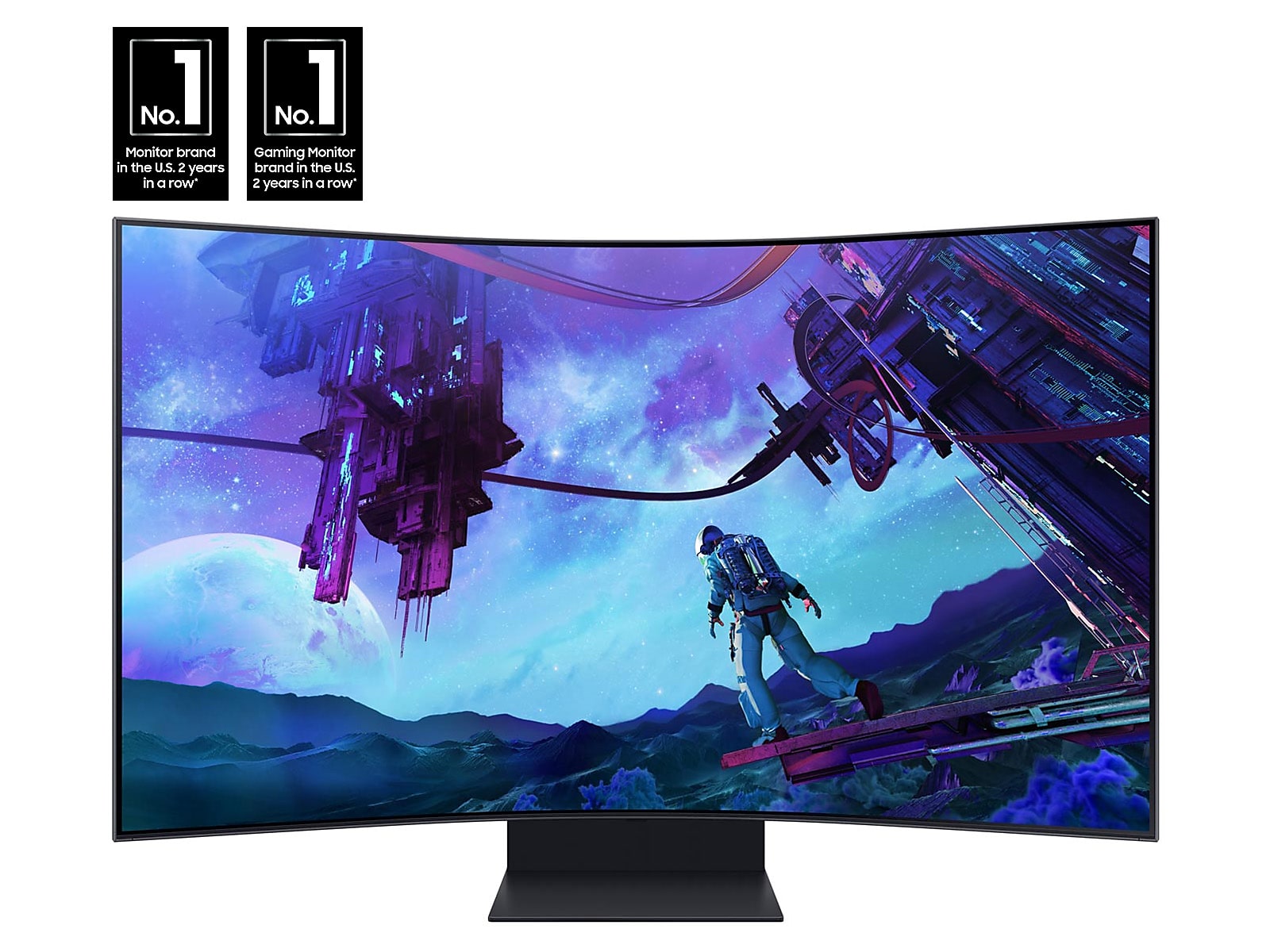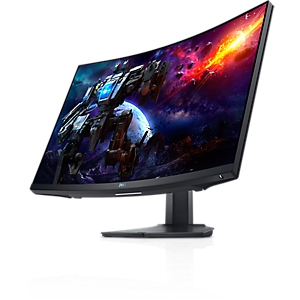- Screen size: 34 inches
- Panel type: OLED
- Aspect ratio: 21:9
- Resolution: WQHD (3440 x 1440)
- Brightness (peak): 1000 cd/m2
- Refresh rate technology: 175Hz
- Price on publish: $1,099.99
Best Gaming Monitors: 12 Displays for Immersive Gaming


Our evaluations and opinions are not influenced by our advertising relationships, but we may earn a commission from our partners’ links. This content is created by TIME Stamped, under TIME’s direction and produced in accordance with TIME’s editorial guidelines and overseen by TIME’s editorial staff. Learn more about it.
There are countless gaming monitors available on the market, ranging from massive curved widescreen displays to tiny models that provide smooth and fluid gameplay. Unless you understand what you need from a monitor, however, it can be difficult to pick out the best screen for your gaming needs.
For example, would it be best to invest in an extra-large bright and colorful 4K OLED monitor, or a compact Full HD model with a high frame rate for online gaming? What is the best resolution and size for your setup? Which is the best pick for your budget? Since it’s disappointing to bring home a subpar monitor, or a screen that’s a poor fit for how you play, I’ve researched, tested, and evaluated an array of gaming monitors to find the best model for your preferred resolution, size, and more.
Whether you’re searching for a huge ultrawide for gaming and productivity on the side, a screen with above-average specs at an affordable price, or a display with a blisteringly fast refresh rate for staying competitive online, these are the best gaming monitors of the year.

OLED displays are known for displaying a lifelike range of color, a stark contrast between light and dark tones, and tend to be notably brighter than other gaming monitors. This Alienware builds upon a beautiful color range and high contrast foundation with its deeply curved display, high 175Hz refresh rate, ergonomic stand, slick futuristic design, and impressive array of 10 ports and four cables that are included. No matter whether you prefer single player titles or frantic online multiplayer games on PC or console, this monitor’s rich and vivid colors, responsive gameplay, and pitch-perfect contrast never ceases to impress. It’s no wonder it has ranked high on many “Best of” lists and has garnered hundreds of four-star-plus reviews for it’s immersive gaming experience.

For less than $300, the HP OMEN 32q and its colorful HDR display, fast refresh rate, and lag-free gameplay is easily the best value-packed midrange gaming monitor available today. I appreciate the OMEN 32q’s spot-on color accuracy, highly adjustable slim stand, and how it has multiple ports for connecting a PC and up to two consoles at once to easily hop between platforms. It may not feature 4K visuals or integrated speakers, but the OMEN 32q brings a lot of value—with a high 165Hz refresh rate— for an affordable monitor.
Between its vibrant QHD display, versatile and sturdy design, and consistently smooth and fluid gameplay, the HP OMEN 32q is this year’s ultimate midrange gaming monitor.

Some gamers prefer a 1440p gaming monitor for its balance of vivid colors, smooth gameplay, and minimal input lag, and the Acer Predator XB273U delivers a premium gaming experience without reaching the prices of high-end 4K monitors. This Acer monitor features rich and detailed visuals, exceptionally smooth gameplay and practically zero input lag for playing on a PC, Xbox Series X/S, or PS5.
This Acer gaming monitor sports high-end gaming performance and visually sharp, colorful, and detailed visuals making it well worth the price.

Although they aren’t nearly as pretty as 4K displays, many online gamers value 1080p gaming monitors like the BENQ EX270M Mobius for their lightning-fast frame rates, minimal input lag, and low price. Perfectly suited for affordable console and PC gaming, this 1080p monitor features a sharp contrast between light and dark tones, a highly adjustable stand, and an extremely high 240Hz refresh rate for fast and fluid competitive gaming as it was meant to be experienced.
Whether you need a solid affordable gaming monitor, or universally smooth gameplay, BENQ has you covered with this all-around great display.

This MSI model passed the VESA (Video Electronics Standards Association) ClearMR 8000 certification to ensure clear pixel performance. What this means is that you get a lifelike color palette, clear fast movement, buttery smooth refresh rate, and deep contrast without the extra cost attached to similar, yet much more expensive 4K gaming monitors. It displays rich black tones and a vibrant range of color delivers crisp and smooth visuals, and I also appreciate its highly adjustable ergonomic design, dependably lag-free performance, and collection of convenient ports.
If you want a stellar 4K monitor for console or PC gaming, this clear and vibrant MSI edition is perfect for enjoying your games at their visual best without breaking the bank.
Get it here: MSI 34-Inch MPG 321URX QD-OLED

Samsung’s latest Odyssey Ark is a deeply curved 55” ultrawide gaming monitor that has more going for it than its mammoth size, such as the ability to connect and display up to four input sources at once, reliably smooth and fluid 4K gameplay, and a versatile stand that flips 90 degrees for a vertical cockpit mode just in case you prefer an extra-tall screen. The gigantic Ark is made for immersive gaming experiences, fast and frenzied online gaming, and excels at multitasking, making it a top pick for streamers and anyone who spends a considerable amount of time gaming and staying productive in their home office. Sure, its high price keeps it from being enjoyed by the average gamer, but for dedicated video game enthusiasts with money to spend, it’s worth exploring digital worlds through its deep curvature, gigantic ultrawide display, and rich integrated sound system.
The Samsung Odyssey Ark 2nd Gen is a high-priced option, but its array of features and genuinely gorgeous presentation blows other ultrawide gaming monitors away.

Gaming can be a particularly expensive hobby, but the good news is that there are a few budget-friendly gaming monitors that punch above their weight, like this 27” model from Dell. Its low price point caught my attention, but its fast 165Hz refresh rate, consistently smooth visuals, and surprisingly sharp curved QHD display provided a much prettier and more immersive gaming experience than I had initially expected. While it may have far fewer features than pricier gaming monitors, this is a value-packed display that thrifty PC and console gamers will appreciate.

No one would blame you for being skeptical about the world’s first bendable gaming monitor, but LG and Corsair teamed up to release an impressive display that allows owners to transform their screen from an immersive curved model to a traditional ultrawide screen in moments, and it’s extremely easy to appreciate. This curved monitor is an impressive 45” OLED giant that features a lightning-fast refresh rate for online gaming, a gorgeously vibrant and bright display, and its dual curved and ultrawide options makes it a snap to swap between its deep curvature mode for immersive gaming, to a sizable flatscreen for maximum productivity at a moment’s notice. You can enjoy viewing it on a stand or mounted on a wall.

Whether you need a featherweight display for casual gaming on the go, a second screen for multitasking, or an affordable 4K monitor for PC or console gaming, this small, yet value-packed ViewSonic monitor is worth consideration. While this fairly priced portable monitor doesn’t have a particularly high frame rate for action-packed online gaming, its colorful high-contrast OLED screen, slim design, integrated stand and speakers, and array of ports makes it an excellent option for single player titles or enjoying cloud gaming during travels wherever you can get a Wi-Fi signal. Its cool, minimal design won this portable monitor an IF Design Award in 2023.
Read, Also: Best Portable Monitors to Boost Your Productivity and Creativity

This console generation’s ability to seamlessly connect to a computer monitor has allowed console owners to play with minimal input lag and extra-smooth gameplay just like their PC gaming counterparts making Sony’s Inzone M9 the perfect companion monitor for the PlayStation 5. This dedicated gaming monitor supports a slick 144Hz refresh rate for smooth online gaming with your PS5, as well as a high-contrast HDR 4K display, a highly adjustable stand, and is a snap to adjust for your preferred PC gaming settings as needed. If you own a gaming PC and PS5, this colorful, responsive, and stylish gaming monitor is a must-own.
Sony knocked it out of the park with how well this gaming monitor compliments the PlayStation 5 with its gorgeous visuals, intuitive modes, low latency, and console-matching aesthetics.
Although they tend to be pricier than the average gaming monitor, models sporting a 240Hz refresh rate feature noticeably smoother gameplay and minimal input lag, making them a highly prized option for competitive online gaming. In addition to supporting fast and fluid gaming, the ROG Swift OLED PG27AQDM’s especially bright and colorful OLED display, premium components and construction, attractive LED backlighting, and ultra-slim bezels gives this monitor extra value for online gamers who enjoy fast-paced multiplayer titles like Overwatch 2 and Halo Infinite. This monitor has won multiple design awards and earned its place on many editor’s “Best of” lists.
If you need a monitor designed for fast-paced 4K gaming and productivity, the TUF Gaming VG28UQL1A delivers the best of both worlds with its colorful HDR display, highly adjustable tilt and swivel adjustment options, and crystal-clear 4K visuals. Although features like reliably smooth frame rates and low-latency visuals provide exceptionally smooth gameplay via your choice of PC or console, its lifelike color range, ergonomic adjustment options, and sleek minimalist design makes it a top choice for the average home office when it’s time to get some work done.
With countless gaming monitors on the market this year ranging from gigantic ultrawide screens to tiny 24.5-inch models, there was a massive collection of screens to thoroughly research, compare, and enjoy playing personal favorite games like Killer Instinct to see which models stood out from the competition.
Between my in-depth investigation into this year’s greatest monitors and decades of gaming experience, I selected the top gaming screens by the following criteria:
If its size enhanced a monitor’s gameplay, such as a smaller model with a lightning-fast refresh rate or a gigantic monitor with a gorgeous display, it helped the display to stand apart from the competition. That line of thinking applies to a monitor’s resolution as well; I personally prefer a gaming monitor with a higher resolution for all-around prettier games, but I understand why some players value a lower FHD resolution and the snappier refresh rates associated with 1080p monitors for smoother online gameplay.
Faster is better when comparing refresh rates and lower for response times between computer monitors. A monitor’s refresh rate refers to how many times a second the display updates with new visual information, so a speedier refresh rate translates to significantly smoother in-game movement and minimal motion blur. A fast refresh rate is helpful for making those critical split-second decisions that win or lose competitive online games.
On the other hand, a monitor’s response time refers to how quickly the display’s pixels are able to transition from one color to another. Response times are measured in milliseconds, and a shorter response time translates to smoother and faster on-screen movements.
I generally appreciate gaming monitors that are loaded with additional features, but at the end of the day, the best lineup of features are the ones that you will get the most use from. While feature lists vary wildly between displays, some of my favorite key features include “High Dynamic Range,” or HDR, which gives monitors a wider range of color and a deeper contrast between light and dark tones, a deeply curved design for a more immersive gaming experience, and a huge ultrawide display.
Everyone’s gaming budget is different, so I set out to find a range of gaming monitors that deliver the most value for your investment. Some players will be satisfied with a small display with a speedy refresh rate for under $300, while others want a gorgeous “no expense spared” enormous gaming monitor with a massive list of features to match, so one of my goals was to list something for everyone.
Although a higher resolution will make games look sharper and allow for more detail, vibrant colors, and a higher contrast between bright and dark tones, it’s important to consider whether or not the games you want to play— like my current favorite Stellaris—are best-suited for higher resolutions and whether your PC is capable of running high-resolution titles at a reliably smooth frame rate.
The most common resolutions offered in modern gaming monitors are Full HD (FHD) at 1080p, Quad HD (QHD) at 1440p, and UHD at 4K.
A gaming monitor’s refresh rate refers to how many times a second the screen updates in relation to in-game movement, represented in Hertz (Hz). A refresh rate of at least 144Hz accommodates the fast and fluid movement needed to display fast motions and allow smooth and responsive gameplay.
At least one HDMI and DisplayPort are the bare minimum number of ports you should accept, but when it comes to gaming monitors, the more ports, the better. Several HDMI ports will allow you to connect multiple consoles to your display for easily swapping between platforms without the inconvenience of moving HDMI cables around, and it’s always convenient to have more USB ports and a headphone jack.
While that 55-inch behemoth looks awesome in the store, it’s important to consider the best sized gaming monitor to match your space. Many consider a 27-inch monitor to be the perfect size for gaming because of the size and resolution, but there are benefits and drawbacks to compact and ultrawide models as well.
Gaming monitors vary wildly in price from as little as $200, to well over $1,000. Although there are some rock-solid displays available in the $200-$400 range, dedicated gamers may want to save up for a premium edition with a faster frame rate, higher resolution, and more robust list of features.
It is easy for dust, smudgy fingerprints, and other bits of grime to accumulate on your gaming monitor over time—especially if yours is a touchscreen.
But the good news is that it is just as easy to tidy up your display:
Gently wipe the screen with a dry microfiber cloth to remove dust. If you encounter resilient, stuck-on smudges, moisten your microfiber cloth and lightly rub away the lingering residue.
Never use a paper towel or a regular cloth rag to wipe down your monitor. Although they may be gentle on our skin, these cleaning tools are far too abrasive to be used on a gaming monitor and may result in unsightly scratches.
If you’ve owned a gaming monitor for a while, consider removing some of the dust that’s settled inside its case with a blast of compressed air in its rear heating vents once in a while. Do not use compressed air directly on the monitor’s screen, as this may damage it.
When people like myself say that a curved or ultrawide gaming monitor is “immersive,” it refers to how its curvature extends around your natural peripheral vision; this allows the entire screen to be in your vision at the same time, so you will see everything displayed on screen all at once without your eyes darting around to take in the game world unfolding all around you.
A monitor designed with a deep curvature naturally minimizes the movement of a player’s eyes and neck, an ergonomic effect that helps to immerse your mind into the game as it envelops your vision from all sides.
In addition, ultrawide monitors are excellent for multitasking, as the extra-large display allows plenty of space for multiple applications to be open and comfortably fit on-screen at once.
Although they provide a far more engaging experience, there are a few downsides of curved and ultrawide gaming monitors, as these displays tend to be pricier, take up more desktop space than the average monitor, and the unfortunate fact that not every game (especially older titles) was made to be properly displayed on curved or ultrawide screens.
My current favorite 4K gaming monitor is the MSI 34-Inch MPG 321URX QD-OLED. Here are a few things to keep in mind while shopping around for alternate 4K displays:
High Dynamic Range, or HDR, refers to a type of display capable of rendering darker black tones, more vibrant colors, and showcasing a range of brightness levels that standard dynamic range (SDR) screens cannot. Games that support HDR really “pop” with a dynamic array of color, light, and shadow when presented on a gaming monitor that supports the technology, and it’s a feature that is absolutely worth seeking out.
4K monitors may look much better than a FHD display, but the tradeoff is that 1080p monitors tend to have much higher refresh rates. A quality 4K gaming monitor should sport a refresh rate of at least 144Hz or higher.
One of the things I appreciated about the MSI MPG 321URX QD-OLED is that it is cheaper than most 4K gaming monitors out there, while still looking great. Shop around, and you may find another excellent 4K display at a discount too.
The exact models used by esports athletes vary from player to player, however there are a few aspects tying together their most popular gaming monitors. These include a particularly high frame rate of at least 240Hz, a smaller 25-inch monitor, and a 1080p resolution.
While the blazing-fast frame rates and microscopic input lag may be great to help climb the leaderboards, it’s much more important to consider the types of games you enjoy the most before investing in a gaming monitor.
Just as there isn’t a single universally approved best gaming headset or gaming desk, there is no one-size-fits all gaming monitor panel type that best suits all players. Each of these screen types has its benefits, and it’s up to you to consider which display is the right choice for your gaming needs. Here are some things to consider:
In-plane switching, or IPS, screens are commonly used for gaming monitors and comprise a majority of this list. These monitors are prized for their fast refresh times, vibrant color ranges, and wide viewing angles.
Organic light-emitting diode, or OLED screens are best known for their lifelike color palettes, fluid motion, and high-contrast imagery with rich black tones. OLED monitors deliver a beautiful gaming experience, however because of how they are designed, these displays are more prone to “screen burn in” than other monitor types.
Although vertical alignment (VA) panels are similar to IPS displays, VA monitors are notable for having a deeper contrast between light and dark tones. This translates to smoother motion in darker in-game environments and richer black tones than IPS screens can produce.
There is no one-size-fits-all best monitor size, just the best monitor for enjoying from your gaming chair. But some things I consider are:
Anything under 27 inches is considered a small monitor. Perfect for cramped spaces, these affordable displays are often equipped with notably high refresh rates, a 1080p resolution. and a low price tag. It is common to see a row of 24-inch monitors used for esports tournaments, where teams meet and compete head-to-head.
Many consider a 27-inch monitor to be the perfect combination of size when seated directly in front of it, and an attractive 1440p or 1080p resolution.
Gaming monitors start being considered large after 30 inches, and while the best of these sport an immersive curvature and a 4K resolution, players will need extra space to both place it on a desktop, as well as more room to be comfortably seated in front of it.
These extra-large, rectangular monitors are built with a unique 21:9 screen ratio, allowing for a much wider field of view when compared to the average display. While a great ultrawide monitor delivers a more immersive gaming experience by placing more visual information on screen at once than the average monitor, the additional screen space is excellent for multitasking and watching movies too. Note that ultrawide gaming monitors tend to be fairly expensive and take up a substantial amount of desktop real estate. If you are ready to invest in a monitor, you might want to also research what is a gaming chair to find the most comfortable accessories for your set up, like a budget gaming chair and wireless gaming headset.
Unless you are a professional esports player, a gaming monitor with a 144Hz refresh rate is more than good enough for the fast and fluid gameplay needed to compete in online games.
Since every moment matters in shooting, racing, fighting, and other online games, the higher the refresh rate, the faster the on-screen movements will appear for you, allowing you to make those important split-second game-winning decisions.
Note that a 60Hz monitor is considered the standard, but most of the gaming monitors on this list feature a refresh rate of 165Hz or higher for even smoother gaming.
The information presented here is created by TIME Stamped and overseen by TIME editorial staff. To learn more, see our About Us page.



